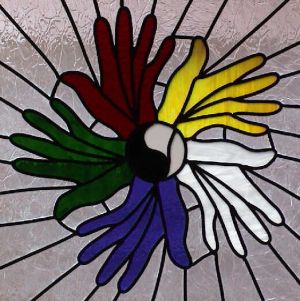|
Chi
(Qi) Everyone knows the difference between when they are tired and when they feel ready to run a marathon. This energy level is our drive, our impetus, but also shapes our personality and governs our emotions. It is the essence of human life, the Life Force, an essential part of the Spirit. The concept of Chi (or, Qi, in Japanese) is central to Traditional Chinese Medicine(or TCM), and is even thought of as a substance, like blood. There are many different kinds of Qi, with examples like Food Qi, Air Qi, Jing, and Wei Qi, discussed briefly below. |
|
As Qi flows through any Meridian, it takes on the characteristics and imbalances of its associated organ. When unadressed, these imbalances can lead to symptoms. TCM views what we call symptoms as messages that the body sends us, and learning how to read them is simply a matter of training. The intention of Zen Shiatsu is to correct any imbalances at their source(s) before a condition can deteriorate into what western medicine would call disease. |
Food Qi
This kind of Qi is simply the
energy or essence derived from food through the digestion.
The nutritive fuel, the part of food which the body transforms into something
it can use.
Air Qi
This kind of Qi is simply the
energy or essence derived from air through the inspiration part of breathing.
This is oxygenated 'nutritive' fuel, the part of breathing which the body
transforms into something it can use.
Jing
A complex concept, there are
2 kinds of Jing: pre- and post-natal. Pre-natal Jing is our inherited
pure essence, our constituional Qi
formed with us in the womb, and determines who we are to become physically-
it includes our genetic code. Post-natal, or acquired Jing, is the
essence acquired from food and air; and serves as a buffer between Qi usage
and pre-natal Jing storage. Jing is our reserve fuel tank, the source for
extra energy when we need it; and when we spend Jing, it is the Post-natal
we use.
Jing is thought of as a substance like blood and is stored in the Kidney. Since this is a TCM concept, you won't find the Jing if you were to dissect a Kidney; however this theory is reinforced by the presence of the adrenal glands, which are located on top of the Kidneys. When we are having an adrenaline surge, we are spending Jing.
"It Don't Mean A Thing If It Ain't Got That Jing"
Jing is always a finite quantity,
and when we spend all of the pre-natal Jing, our life ends.
Pre-natal Jing cannot be replaced but post-natal Jing can be revitalized
with proper diet, lifestyle, and health. It is therefore very important
to nurture what Jing remains in order to keep living.
We do this by eating and breathing as well as possible, in addition to living
well and exercising. Exercise, in addition to its known physical benefits,
serves to charge the post-natal Jing, similar to the way that eating does;
and helps the body use less Jing, using what it uses more efficiently. Seen
from a TCM perspective, the 'known phyical benefits' of exercise are actually
side effects of envigorating the post-natal Jing.
Wei Qi
The concept of Wei Qi is complex as well. Wei Qi is our surface energy, which not only controls our immune system, but also regulates our body temperature. It is located above the skin's surface, and can be likened to the concept of the body's Aura: a field of energy eminating from and surrounding our body. Wei Qi is the energy we use during the day, which is abundant when we wake and depleted when it's time to sleep. Interestingly, when we sleep, Wei Qi actually shrinks internally, through the body's surface to our core, while we rest; this is why the body temperature apparently lowers, and we sleep under blankets. It is during this time that the Wei Qi is being replenished and recharged, which is the very process of rejuvination that is sleeping.
Wei Qi is created from 3 sources: Jing, Food Qi, and Air Qi.
The nightly recharging of Wei Qi being 'quality sleep' is part of living well: if anything is impeding the process, then Wei Qi doesn't entirely shrink internally and doesn't efficiently recharge. This can be caused by a number of factors which would compromise sleep quality, including some we wouldn't normally consider, like wind. For example, if we sleep with a fan blowing on us, we can wake feeling stiff and unrested because part of the Wei Qi essentially didn't get to rest, undermining the entire process. The same result can be reached by eating a large meal then sleeping: the functions of each process underway are at cross-purposes with each other, and compromising the efficiency of each other's functioning. In addition to all the other problems it can cause, poor sleep quality for whatever the reason can affect or even compromise our immune system because it is governed by the Wei Qi.
The importance of eating well and breathing well cannot be stressed enough for promoting good quality of life.
